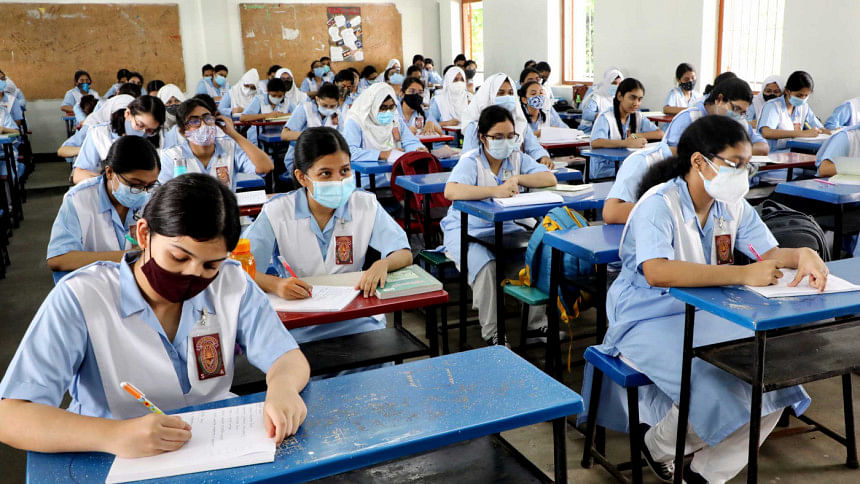International Day of Education: Are we doing enough to recover learning loss?

The main motto of this year's Education Day is transforming education radically to reflect the changes occurring right now. It also advocates equity and democratic participation. As we approach the third year of the pandemic, the importance of addressing the concerns of unrest, inequality and exclusion in education is higher than ever before. Undoubtedly, inequality and exclusion are among the hardest challenges the education sector has been facing since the beginning of the pandemic, and it is clear that technology on its own is not a solution, but a component of inequality itself. The question is, can we bring necessary reforms to minimise the inequality, or are we just leaving the students to their fates?
In Bangladesh, schools remained closed due to the pandemic for more than 500 consecutive days, the longest in the world (and now, we've entered another episode of closure which, one hopes, will not last long). The effect of this closure is nothing less than a pandemic itself, as it has thrown around 35 million children out of school or any kind of learning system. During this long period, a substantial number of children had either minimal to no contact with the educators, did not have access to any classroom teaching-learning process, or were forced to drop out for various socio-economic reasons.
Because of the loss of a whole school year, students have been promoted to the next grades without having achieved their grade-level competencies. Achieving grade-level competencies and learning outcomes has been a challenge for them despite a promising rate of school enrolment. For example, according to the National Student Assessment 2017, 62 percent of grade 3 students and 76 percent of grade 5 students did not achieve their grade-level competencies in mathematics. The statistics for other grades and subjects are more or less the same. Then, the complete absence of in-person learning for a long time certainly made the situation worse. Even with the students who have been able to continue their studies during school closure, it is hard to be hopeful because of the massive learning gap created in this period, despite various efforts of distance learning.
Ideally, minimising or recovering this learning loss should have been the main objective. But the method adopted after reopening of schools in September 2021—with fewer classes for early grades, shorter syllabi and fewer subjects for tests—means that instead of addressing the loss, the learning time has actually been shortened for the students who are not attending any public exams. Hence, the situation is getting worse every day.
This massive learning gap is one of the many disastrous effects of the pandemic. When the whole country was under strict lockdown, online and TV classes seemed to be the only plausible solution. However, in a country like Bangladesh, the reality of poor access to technology should not have escaped the notice of our policymakers as a large number of students come from poor socio-economic backgrounds. It was obvious that the majority of them would completely fall out of the Covid-19 response and recovery system.
According to UNICEF, 91 percent of students from low-income or rural families have had no access to the internet. This group is certainly amongst the most vulnerable, who are at the risk of dropping out for countless other secondary effects of the pandemic. The government data itself shows that 79 percent of students were not interested in the classes broadcast on TV. The Ministry of Education tried to address the gap with assignments as part of an assessment process. How students dropping out of the learning system can be assessed is a question that no one seems to know the answer to.
We should have realised by now that any response or recovery plan will remain in papers if such overly generalised, one-system-fits-all approaches are taken. Minimising the digital divide and recovering learning loss are two very big challenges that require immediate and equity-focused action plans. Going forward, if distance or blended learning remains the only available option, it must be more inclusive. And that cannot be possible without national-level planning based on expert advice, proper financing, and empowered teachers. Once equity in terms of access to formal education is ensured, recovering learning loss should be on the top of our priority list—not promotion to the higher grades.
Salman Khan, the founder of Khan Academy, the well-known online learning platform used by millions of students globally, aptly put that if technology is not used properly, we might see an "education catastrophe". The scenario on the ground confirms that fear. If we keep more than half of the students outside of a proper learning system, and the rest learns less than half of what they were supposed to learn, our collective future will be damaged beyond repair.
Jannatul Mawa is working with the Ed-tech team of Agami Education Foundation, a concern of the US-based non-profit Agami Inc.

 For all latest news, follow The Daily Star's Google News channel.
For all latest news, follow The Daily Star's Google News channel. 



Comments